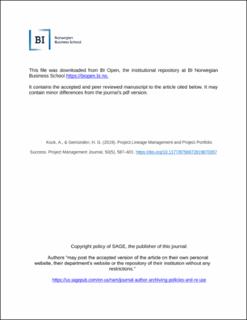| dc.contributor.author | Kock, Alexander | |
| dc.contributor.author | Gemünden, Hans Georg | |
| dc.date.accessioned | 2020-06-09T10:56:56Z | |
| dc.date.available | 2020-06-09T10:56:56Z | |
| dc.date.created | 2019-10-02T10:49:11Z | |
| dc.date.issued | 2019 | |
| dc.identifier.citation | Project Management Journal. 2019, 50 (5), 587-601. | en_US |
| dc.identifier.issn | 8756-9728 | |
| dc.identifier.uri | https://hdl.handle.net/11250/2657345 | |
| dc.description.abstract | Project portfolio approaches consider various concurrent project interdependencies but typically neglect longitudinal interdependencies. These are important for exploratory projects, which create strategic options. If these options are not exploited in successive projects they become lost opportunities. This study analyzes 138 firms regarding their extent to consciously manage project sequences. We differentiate between proactive lineage (planning a roadmap of future projects) and reactive lineage (using learnings from past projects). Results show that both practices are positively and independently related to portfolio success. We derive suggestions for future research and discuss which theoretical foundations could be used to better understand the impact of lineage management. | en_US |
| dc.language.iso | eng | en_US |
| dc.publisher | Sage | en_US |
| dc.title | Project Lineage Management and Project Portfolio Success | en_US |
| dc.type | Journal article | en_US |
| dc.type | Peer reviewed | en_US |
| dc.description.version | acceptedVersion | en_US |
| dc.source.pagenumber | 587-601 | en_US |
| dc.source.volume | 50 | en_US |
| dc.source.journal | Project Management Journal | en_US |
| dc.source.issue | 5 | en_US |
| dc.identifier.doi | 10.1177/8756972819870357 | |
| dc.identifier.cristin | 1732887 | |
| cristin.ispublished | true | |
| cristin.fulltext | postprint | |
| cristin.qualitycode | 1 | |
